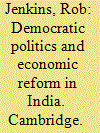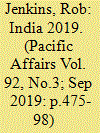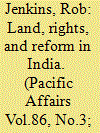|
|
|
Sort Order |
|
|
|
Items / Page
|
|
|
|
|
|
|
| Srl | Item |
| 1 |
ID:
001827


|
|
|
|
|
| Publication |
Cambridge, Cambridge University Press, 1999.
|
| Description |
xx, 200p.
|
| Standard Number |
0521659876
|
|
|
|
|
|
|
|
|
|
|
|
Copies: C:1/I:0,R:0,Q:0
Circulation
| Accession# | Call# | Current Location | Status | Policy | Location |
| 042993 | 321.80954/JEN 042993 | Main | On Shelf | General | |
|
|
|
|
| 2 |
ID:
085181


|
|
|
|
|
| Publication |
Cambridge, Cambridge University Press, 1999.
|
| Description |
250p.
|
| Series |
Contemporary South Asia; no. 5
|
| Standard Number |
0521659876
|
|
|
|
|
|
|
|
|
|
|
|
Copies: C:1/I:0,R:0,Q:0
Circulation
| Accession# | Call# | Current Location | Status | Policy | Location |
| 045711 | 321.80954/JEN 045711 | Main | On Shelf | General | |
|
|
|
|
| 3 |
ID:
167465


|
|
|
|
|
| Summary/Abstract |
India’s 2019 general election returned Prime Minister Narendra Modi, leader of the Hindu nationalist Bharatiya Janata Party (BJP), to a second term in office. The BJP increased its parliamentary majority and expanded beyond its core regions. Its victory was all the more impressive given the economy’s mediocre performance during Modi’s first five years in office and serious signs of political disaffection, including BJP losses in important state-level elections, just months before the national campaign commenced. Modi’s ability to turn things around is a testament to his personal popularity as well as the BJP’s well-funded and organized political machine. But it also reflects the party’s willingness to stoke nationalist passions, target minority groups, harass civil society, politicize national security, and undermine institutions of accountability. Despite the BJP’s impressive showing, and some of the methods by which it was achieved, claims that the 2019 election represents a transformation in the nature of Indian politics should be treated with caution.
|
|
|
|
|
|
|
|
|
|
|
|
|
|
|
|
| 4 |
ID:
058935


|
|
|
|
|
| Publication |
Oct 2004.
|
| Summary/Abstract |
This paper advances three inter-linked arguments about the NDA government’s performance on labor reform. First, like its predecessors, the NDA government has continued to “reform by stealth,” facilitating backdoor policy changes rather than effecting them through overt decision-making. This has involved, among other things, relying on state-level leaders in India’s federal system to negotiate awkward political dilemmas. Second, though the NDA avoided directly reforming core labor legislation, it nevertheless helped to nudge labor reform from the narrow confines of elite politics onto the terrain of mass politics – an important aspect of the transition from first- to second-generation reform. Third, on the other key indicator of this transition – the building (or resuscitation) of institutions – there has been little progress. Indeed, the institutions necessary to manage the transition to a new labor-relations regime have been actively undermined, not least as a result of the Machiavellian politics involved in the process of reforming by stealth
|
|
|
|
|
|
|
|
|
|
|
|
|
|
|
|
| 5 |
ID:
128535


|
|
|
|
|
| Publication |
2013.
|
| Summary/Abstract |
India's legal regime governing the compulsory acquisition of private land by the state for "public purposes" - centered on the Land Acquisition Act 1894 (LAA) - has long been criticized for breeding corruption and insufficiently protecting landowners and local communities. Attempts to overhaul the LAA have faced stiff resistance from powerful interests within and outside the state. When the United Progressive Alliance government took power in 2004, few would have guessed that it would seek to replace the LAA with legislation that imposes more rigorous standards for the compulsory acquisition of land and detailed rules for rehabilitating displaced people. Yet, in 2011 the government introduced the Land Acquisition, Rehabilitation and Resettlement Bill (LARRB). This article argues (1) that the LARRB displays certain distinctive characteristics shared by other rights-related statutes enacted under the UPA government; (2) that the emergence of this distinctive - and unforeseen - piece of legislation was driven largely by India's approach to creating Special Economic Zones; and (3) that both the LARRB's content and the process by which it was introduced have implications for debates of wider theoretical significance, including the increasingly hybrid nature of rights, and the desirability of combining insights from the literatures on "policy feedback" and "policy entrepreneurs."
|
|
|
|
|
|
|
|
|
|
|
|
|
|
|
|
| 6 |
ID:
085405


|
|
|
|
|
| Publication |
New Delhi, Oxford University Press, 2004.
|
| Description |
xii, 308p.
|
| Standard Number |
0195668081
|
|
|
|
|
|
|
|
|
|
|
|
Copies: C:1/I:0,R:0,Q:0
Circulation
| Accession# | Call# | Current Location | Status | Policy | Location |
| 051600 | 321.0230954/JEN 051600 | Main | On Shelf | General | |
|
|
|
|
|
|
|
|
|